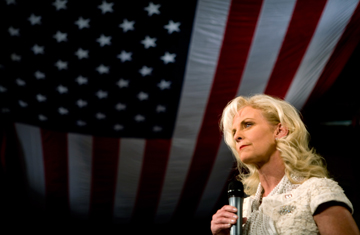
Cindy McCain, wife of Republican presidential candidate Senator John McCain, at a town-hall meeting at Reed High School on July 29
It's not every aspiring First Lady whose comfort zone is a war zone, but such is the case for Cindy McCain, who left today on a mission to Georgia to assess the civilian casualties of the Russian invasion.
McCain is traveling with the U.N.'s World Food Programme, whose work she monitored in Southeast Asia and Africa this spring and summer. McCain plans to meet with Georgian President Mikheil Saakashvili and to visit wounded Georgian soldiers. She would also visit representatives of the HALO Trust, which works to remove land mines and on whose board she serves.
Cindy and John McCain visited Georgia together last year; in an interview with TIME at her Sedona, Ariz., ranch before she left, she emphasized that her years of work on overseas missions was an "important part of what I'm about, what makes me tick."
Cindy McCain said she has been trying to get into Georgia since the conflict started, but it took time to arrange the logistics. Her husband, she said, is "very supportive. As soon as he saw what was happening — he and I, we connect on many levels. I mean, he knew immediately [that I would want to go]. I've been to Georgia with him; I know the country."
Her aides say that the timing of the trip, during the Democratic National Convention in Denver, was never a consideration. But that doesn't mean they're ignoring the subtext. "She's on the phone with the World Food Programme; he's on the phone with Saakashvili," McCain adviser Nicolle Wallace told me. "It was a great picture of what they'll be like in the White House."
As she prepared to leave, Cindy McCain spoke of her concern about the situation there. "There's a very serious land-mine issue now because there are land mines being laid as we speak," she said. "There's a whole bunch of things going on right now, and as we begin to move refugees from Point A to Point B or try to feed refugees who are stuck in pockets around the country, we're running into the issue of the blowing up of humanitarian vehicles that are trying to get to the refugees. So it's a whole morass of problems now."
McCain's first exposure to the issue of land mines was after the first Gulf War, when she traveled to Kuwait with the medical group she had established in 1989, American Voluntary Medical Team. "We went basically as an emergency team, not knowing what we'd be getting into," she recalled. "We discovered, as did the Kuwaitis, that the Iraqis had planted land mines in the playgrounds. So we hadn't been there 12 hours, and the first case we get is a young child who had gone outside to play on the teeter-totter and stepped on a land mine. That was my first experience with land mines."
She has heard similar reports of injuries to civilians and refugees in Georgia, which she hopes to investigate. "When people begin to run, they run for places that they know are safe — schools, churches, community centers — and those are the first things that are mined," she said.
She has slipped away from the campaign trail frequently this year: in March, McCain visited Kosovo with HALO to assess progress in clearing minefields there. In June, she was in Vietnam, Thailand and Cambodia, working with Operation Smile, the charity that helps disfigured children and on whose board she also serves. In July, she was in Rwanda, reviewing relief efforts by the World Food Programme. She plans to return to the U.S. from Georgia late Wednesday. "It's a very quick trip," she says.
